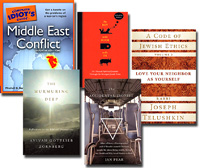All the books presented here are concerned either with Torah or Israel, or both.
Rabbi Ian Pear might argue that one leads to the other, as happened to him. The Accidental Zionist (New Song, cloth, $19.48), subtitled, “What a Priest, a Pornographer and A Wrestler named Chainsaw taught Me about Being Jewish, Saving the World and Why Israel Matters to Both” [sic], weaves those elements into an amusing and ironic story of how Pear went from a non-religious person to Orthodox rabbi (briefly considering becoming a stand-up comedian).
The enthusiasm and personal appeal of this Jerusalem-based rabbi and founder of Shir Hadash synagogue shine through, but the point laid out, in the book’s second half, is to convince you that it is your religious, spiritual and national obligation to return to Israel and help rebuild it as the nation-state and light of the nations promised in the Torah.
It’s a big dream, and you might not buy it, but it’s a story well told, and along the way you’ll get some history and biblical learning.
For (mostly) pure politics, get your dose of history and current events in The Complete Idiot’s Guide to Middle East Conflict (fourth edition), by Mitchell G. Bard, Ph.D. (Alpha, paper, $19.95), which dovetails nicely with the religious approach of Pear’s book, if you tackle them together.
Bard is the executive director of the American-Israeli Cooperative Enterprise and director of the Jewish Virtual Library. In the manner of all “Idiot’s” books, you’ll find his examination and analysis of the region synthesized into short essays, along with sidebars of facts and figures, cleverly titled, “Ask the Sphinx,” “Sage Sayings,” and “Tut, Tut!”
A book like this needs to be updated often and this one, the fourth edition in 10 years, is probably already due another revision following Israel’s most recent Gaza incursion, the recent Israeli election and the impact of falling gas prices.
For pure Jewish learning, here are three new books to help you out.
Take a traditional approach with prolific Joseph Telushkin’s newest volume, A Code of Jewish Ethics (Volume 2): Love Your Neighbor As Yourself (Bell Tower, cloth, $32.50). Thousands of years of Jewish wisdom regarding how we treat people and animals is consolidated here in the most accessible fashion. The usual commentators are cited, but so are the thoughts of contemporary scholars and ordinary folks. Read from beginning to end or flip it open to a random page and begin to learn. A fortuitous flip to page 221 reveals a discussion about tainted money, striking an uncomfortably close chord in the wake of the Madoff and Wall Street banking scandals.
Avivah Gottlieb Zornberg’s The Murmuring Deep: Reflections on the Biblical Unconscious (Schocken, cloth, $27.95) takes a less traditional approach. Teetering toward the scholarly, it does require careful reading, but is still accessible to those wanting — desiring, the author might say — a glimpse into the subconscious workings of biblical characters. Zornberg turns an analyst’s eye, or ear, to the text. We can communicate through silence, so what can we learn from the “silence” of the Torah, the places where there are no words to guide us? Using analytic and Jewish teachings, Zornberg attempts to decipher what biblical figures were thinking.
In another new book, mysteriously titled, The Boy on the Door on the Ox (Aviv, paper, $17.99), Rabbi Martin Samuel Cohen offers a different approach to rabbinical texts.
“I’ve felt myself to be a pilgrim on the dusty road to Jerusalem for almost my entire adult life,” he declares, then proceeds to show us how to look at some challenging Mishnayot (plural of Mishna) as guides to deeper spiritual understanding and self-knowledge, bringing meaning to some of the more elusive rabbinical commentaries.
There are six books (or sedarim — orders) of Mishna and the author bases this book on one of the “least studied — by far, almost to the point of being totally ignored,” the Seder Tohorot or the Order of Purities. These are the rules that make us squirm: Rules about bodily fluids, cleanliness and impurity. But Cohen turns this around and shows us how, after many years of study, he was able to use the “characters” in these texts as spiritual guides, elevating these seemingly earthy words to an ephemeral level. At the same time he manages to make the texts more relevant to many, or most, Jews who do not concern themselves with the laws of niddah (ritual purity).
What ties this all together, and makes the book entertaining, too, are Cohen’s stories of his own personal growth, as he strives to be a better father, husband and congregational rabbi. Witty, self-deprecating, ordinary and extraordinary all at the same time (the guy has visions! How cool is that?), this occasional novelist also manages to employ obscure vocabulary words in a way that entertains us without being obnoxious. (i.e., “desuetude” — what the prescribed thrice-yearly pilgrimages to Jerusalem have fallen into.)
Not a Talmudist myself, I’d like to believe that this book could be helpful to the scholarly as well as ordinary Jews who seek a little more understanding.
Linking Torah and Israel
